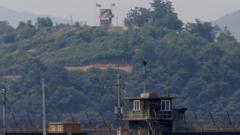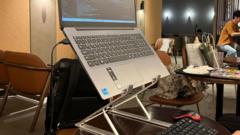The recent political turmoil surrounding former President Yoon Suk Yeol highlights South Korea's unwavering democratic spirit and the people's readiness to defend their freedoms.
# South Korea's Democratic Resilience Against Authoritarianism

# South Korea's Democratic Resilience Against Authoritarianism
In the face of growing authoritarianism, South Koreans demonstrate the strength of their democratic principles.
In a dramatic unfolding of events, former South Korean President Yoon Suk Yeol attempted to consolidate power, but the resilience of the nation's democracy proved stronger. Yoon's tenure, marred by incidents of autocratic behavior, sparked widespread protests culminating in an urgent declaration of martial law on December 3rd, 2023.
Initially dismissed as a mere presidential eccentricity, Yoon’s obsession with power—manifested with the word "king" inscribed on his palm during his campaign—quickly transformed into authoritarian governance post his May 2022 inauguration. His controversial moves included relocating the presidential office to a military facility and showcasing a military-style tribute from his security team during his birthday celebration, which was emblematic of his self-aggrandizing style.
The tipping point came when Yoon aggressively targeted dissent, deploying bodyguards against protesting students and employing judicial measures against journalism critical of his administration. The president's actions affronted a sacred South Korean value: freedom.
The public's spirit resembled their historical fight against past authoritarian rule; generations have endured oppression to forge a democratic society. Every significant political evolution—be it ending dictatorship or enforcing free elections—was a result of collective citizen struggle. Following the martial law declaration, protests erupted across the nation, highlighting the people's commitment to preserving their hard-won rights.
Thus, the current moment stands as a testament not only to the vulnerabilities within South Korea's democratic framework but also to its resilience. The active participation of citizens in standing against oppression signals a robust democratic ethos, emphasizing that in South Korea, democracy is a living, breathing achievement—not merely a granted privilege.
Initially dismissed as a mere presidential eccentricity, Yoon’s obsession with power—manifested with the word "king" inscribed on his palm during his campaign—quickly transformed into authoritarian governance post his May 2022 inauguration. His controversial moves included relocating the presidential office to a military facility and showcasing a military-style tribute from his security team during his birthday celebration, which was emblematic of his self-aggrandizing style.
The tipping point came when Yoon aggressively targeted dissent, deploying bodyguards against protesting students and employing judicial measures against journalism critical of his administration. The president's actions affronted a sacred South Korean value: freedom.
The public's spirit resembled their historical fight against past authoritarian rule; generations have endured oppression to forge a democratic society. Every significant political evolution—be it ending dictatorship or enforcing free elections—was a result of collective citizen struggle. Following the martial law declaration, protests erupted across the nation, highlighting the people's commitment to preserving their hard-won rights.
Thus, the current moment stands as a testament not only to the vulnerabilities within South Korea's democratic framework but also to its resilience. The active participation of citizens in standing against oppression signals a robust democratic ethos, emphasizing that in South Korea, democracy is a living, breathing achievement—not merely a granted privilege.
















